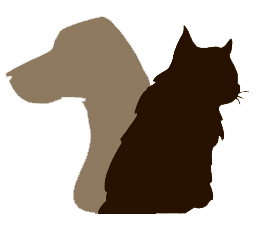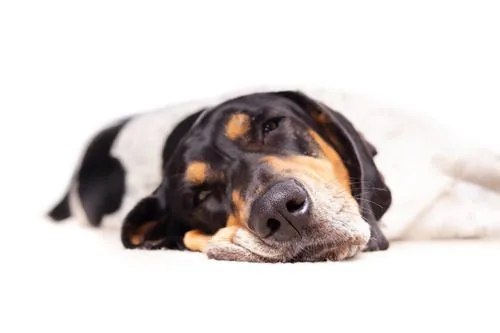What to Know About Hot Spots on Dogs in Ukiah, CA

About Hot Spots on Dogs
Hot spots can appear anywhere on the dog but are most common on the head, neck, and hip area. These spots will range in size and color but are almost always red and inflamed.
Hot spots can be minor and heal quickly but they can become more serious and cause widespread infection or cause skin ulcerations if not treated properly.
These lesions range in size and color but are usually red, inflamed, raw and may bleed. The affected area is usually moist and can become infected when the dog licks, chews or scratches the hot spot. Hot spots look different than other skin infections such as ringworm or mange as it usually is moist or wet and irritated.
Are Certain Dogs Prone to Hot Spots?
Certain breeds are prone to hot spots such as Golden Retrievers, English Bulldogs and German Shepherds. Breeds that spend a lot of time in water or go swimming are also prone to hot spots. Long haired dogs are more prone than short haired dogs and dogs that usually get hip dysplasia can get hot spots.
Most hot spots cause itching, redness and the animal will be prone to lick or scratch it. There are several things that cause hot spots. They include allergies, ear infections, poor grooming, anal gland inflammation, excessive licking, and excessive moisture present on the dog.
Preventing Hot Spots
To prevent hot spots from spreading and becoming worse, the nature of the hot spot and why it appeared needs to be diagnosed. Many treatments are available for hot spots to be treated at home, but a veterinarian is best to correctly diagnose what is causing them.
What Causes Hot Spots on Dogs?
There are many causes of hot spots but here is a list of the usual known causes:
- Allergic Reactions
- Dry Skin
- Anal Gland Disease
- Surface Scratches
- Underlying skin infections
- Over-Grooming
- Excessive licking, biting, scratching from boredom or stress
- Scabies
- Mites
- Injection sites
- Other skin conditions
Since there are many underlying factors that may cause hot spots, it is sometimes hard to diagnose but it usually is always associated with a bacterial growth or infection. Dogs that have a pre-existing condition or an imbalance of bacteria on the skin, are more prone to hot spots than other dogs.
If the area is inconsistent in size or the number or spots are growing, there is a display or colored discharge or they begin to bleed, a veterinarian should be consulted right away to not only diagnose the problem, but to treat it correctly. The dog will continue to either lick, scratch or chew at the spot and it will just irritate the skin even more.
Treatment for Hot Spots on Dogs
A veterinarian will treat the hot spot with oral antibiotics, anti-itch cream and in most cases, an e-collar so the dog will not have access to bother the infected skin any further.
Detecting a hot spot at an early age can help solve the problem more quickly as it is less likely to spread. It can make a huge difference on how the skin condition is resolved more quickly.
Signs Your Dog Has Hot Spots
Before you notice a hot spot, your dog will know it is there and will usually begin excessively licking the spot as it burns and itches. Once the spot is irritated, it will hurt for you to touch it and be causing your dog pain. So be gentle if you see a red spot.
Also, the skin will most likely be wet and moist. This doesn’t help but feeds and spreads the growth of bacteria.
There are other signs your dog will give you that he might have a hot spot:
- Unusual aggression or behavior changes
- Whining, crying or wincing in pain when touched
- Excessive itching of the skin
- Persistent chewing, biting, licking or grooming
- Scaly skin around the sore area
- Sores that are scabbing over or filled with pus
- Excessive warmth that can be felt on the dog’s coat or the skin
- Matted Fur
- Wet Fur
- Fur with a strong odor
- Decreased appetite
- Hair Loss
- Fever due to a possible infection
- Lethargy or depression
These are all signs that your dog might be suffering from hot spots. Look at your dog closely for any of the above signs and seek out professional help from a veterinarian if you have tried some home remedies and they do not work.
Home Remedies for Hot Spots on Dogs
There are several home remedies that people use to help with hot spots. Neosporin, hydrocortisone, and Vaseline should not be used as dogs will lick the area.
Here is the best way to treat and heal a hot spot:
- Trim the area around the hot spot with dog clippers. This will help the area not spread to other areas via the hair and will help let the skin breathe and dry out.
- Clean the area with an anti-bacteria wipe or a mild anti-bacterial soap.
- Place an e-collar on the dog, if you have one, so the dog will not be able to lick, scratch or irritate the skin further.
- Watch the hot spot closely for signs of improvement and healing. The redness and moisture should go away and the lesion itself will become smaller.
If the above home remedies do not work, consult your veterinarian for help.
Talk with Your Veterinarian
The key to preventing hot spots in dogs is to understand the underlying condition that caused it in the first place. A veterinarian can do some testing to see what might be causing the hot spots to appear. Your dog needs to be on flea prevention, groomed regularly, treated for allergies and any skin infections, such as an ear infection.
Just remember that hot spots are common. More so in some breeds than others and can be treated either at home or by a veterinarian. Hot spots range from minor to severe so treat your dog accordingly. Book an appointment with your Mendocino Animal Hospital veterinarian by calling (707) 462–8833 or using the online form!
Recent Posts
Dog UTI Symptoms
Urinary tract infections (UTIs) can affect dogs of any age, breed, or size—and when they do, it…
Ear Mites in Cats
If your cat has been shaking their head, scratching around their ears, or showing signs of discomfort,…
Can Dogs Have Cheese?
Many pet owners enjoy sharing small bites of their favorite snacks with their dogs—especially something as tempting…
What Do Dogs Dream About?
Have you ever watched your dog sleeping—legs twitching, nose wriggling, tail flicking—and wondered what’s going on in…
Is it Normal That My Dog is Snoring?
Dogs snoring can be adorable, but it can also raise concerns for pet owners. If you’re wondering,…
About Mendocino Animal Hospital
At Mendocino Animal Hospital, we believe in fostering the human-animal bond with excellent veterinary medicine. Our full-service veterinary practice operates in Ukiah, CA with a team of skilled veterinarians and a passionate, talented support staff who make you feel like a part of the family.
As an AAHA-accredited animal hospital, every service and aspect of our practice meets AAHA’s Standards of Excellence. No matter what your pet comes in for, they’ll receive only the best in care, compassion, and service.





